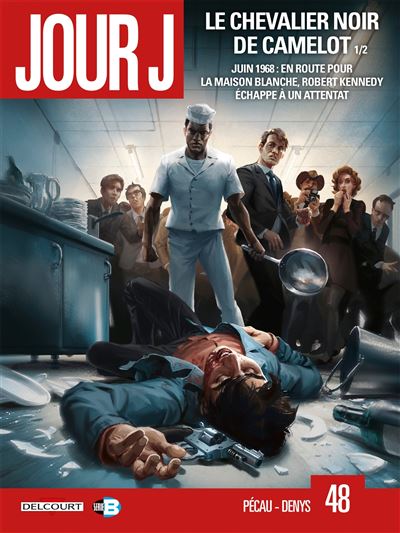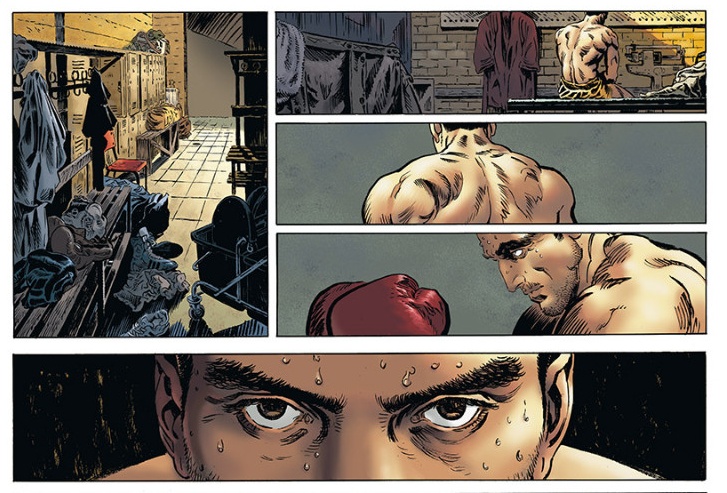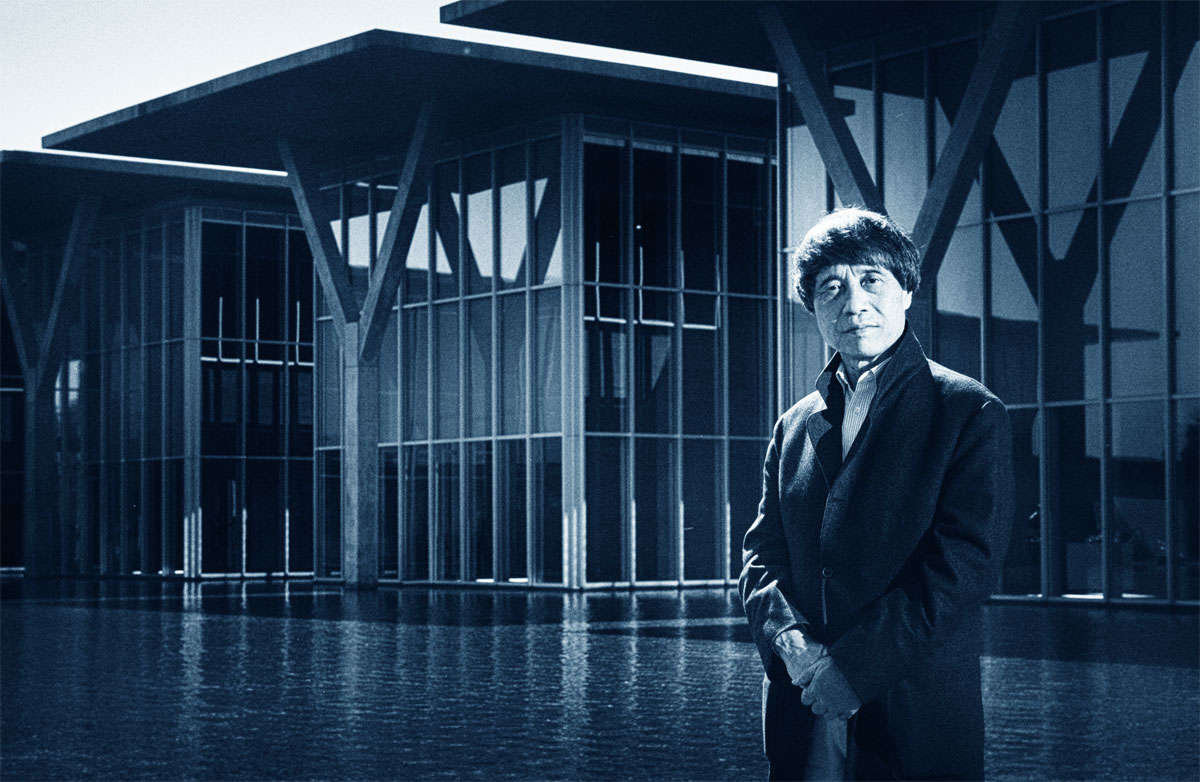All eyes are on Russia, but unfortunately it is not the only authoritarian country. In Turkey, President Erdogan is upsetting democracy with political Islam, but how did he forge these ideas? Can Dundar and Anwar offer Delcourt a biography to understand his rise.
Two authors for a politician
As in And God in All That, Erdogan's introduction is a narrative about the construction of comics. Screenwriter Can Dundar and cartoonist Jbr Anwar are both political exiles. They have a very ambitious project: to show Erdogan's danger to the country. Can Dundar adopts a journalistic approach. An assistant, Gizem, does the research and collects testimonies. By choosing a classic scenario, the very educational book is made so that Westerners understand who Erdogan is, where he comes from and what his ideas are. This rigor is reflected in the drawing by the realism of the faces, the very refined decor and the choice of black and white that never distracts the viewer. 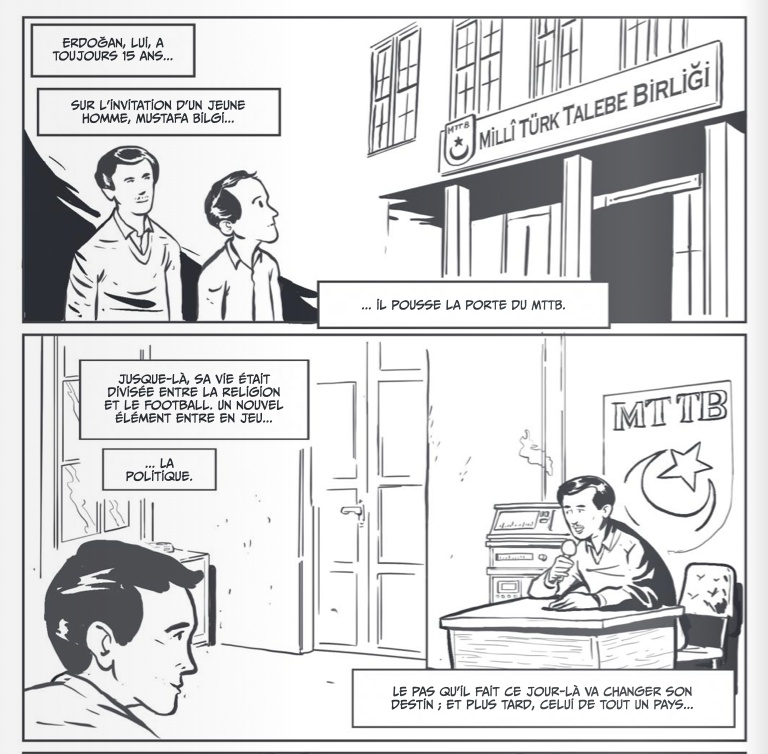
The portrait of a man: Recep Tayyip Erdogan
Erdogan seeks to answer a question: how did a reactionary and highly religious politician impose himself in a secular state that wants to connect with reality? The first part of the answer relates to Erdogan's biography. This political accession would first have psychological causes. Recep is a street child accustomed to all tricks but who goes to Koranic school. His football technique reveals his political temperament: determined and hardworking. His father is demanding and violent: Erdogan has to work after school and attend religious classes at a very young age. Passionate about football, he joined a professional club that paid him to finance his studies. He joined an anti-communist conservative party at the age of fifteen, where he was spotted for his recitation of poems. We then discover his wife who would have had a mystical revelation when meeting Erdogan. It was through women that he achieved political success. Indeed, Erdogan is not just a conservative but he innovates by integrating women into his party. They serve as a local relay and illustrate his double discourse: they are veiled in conservative neighborhoods and bareheaded in more open neighborhoods. Erdogan is not satisfied with strongholds in mosques but he will seek votes everywhere even in immoral places. One senses the commitment by highlighting the shortcomings of Erdogan's official biography. His divorced father abandoned his first family. The young leader is an overrated football player kept in the team for his piety. He rigged the internal youth elections in his party.
The portrait of a country: Turkey
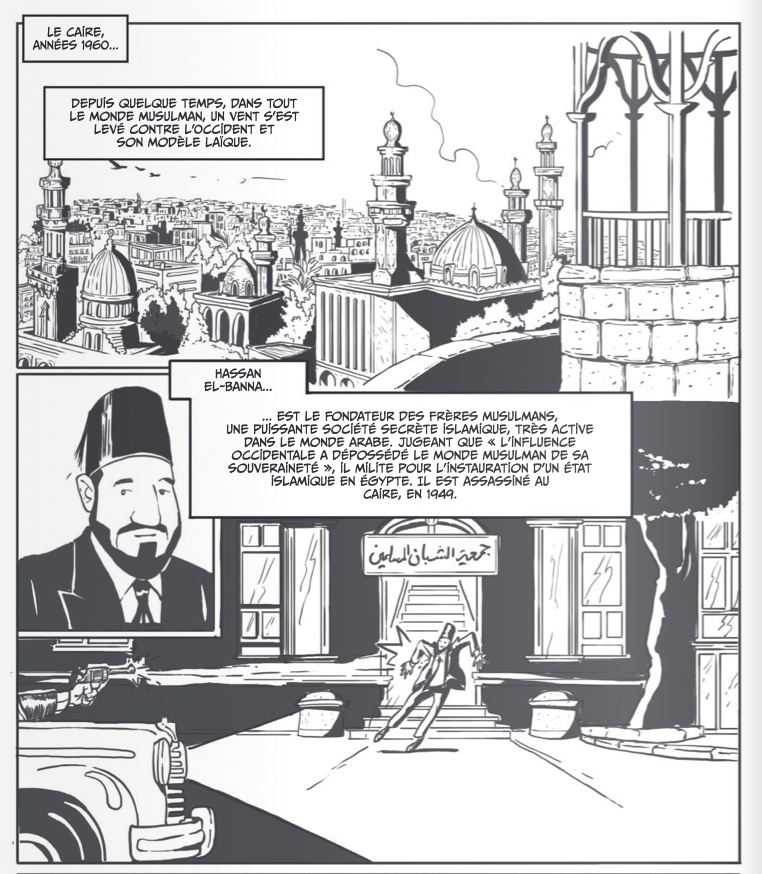 We follow the ups and downs of Erdogan's political career according to the national and international context. The authors take advantage of Erdogan's entry into politics to present the construction of political Islam: in reaction to Westernization, parties praise religion and the return to an invented tradition. These ideas come from the Muslim Brotherhood movement in Egypt and developed during the first war in Afghanistan. However, the use of religion in politics clashes with Turkey's basic principle: secularism. The reader then sees how Erdogan will stone by stone shake this principle until his election as president of Turkey. The French reader understands that the development of preacher high school has formed this conservative elite in power today. The hanging of a Prime Minister shocked a country, but it opened a cycle of violence. The youth of the 1960s was divided between communists and Islamists. This opposition of ideas turns into street violence. Beyond politics, we also enter a society. Erdogan is a success as much on the biography of a charismatic and conservative leader as for the portrait of a country. Short texts are easy to read despite the accuracy of the information. However, we can see a paradox: the rigor of a journalist is contradictory to the political goal. Do not hesitate to read the chronicles on other stories engaged in comics: Res Publica and Sorcières, mes sœurs.
We follow the ups and downs of Erdogan's political career according to the national and international context. The authors take advantage of Erdogan's entry into politics to present the construction of political Islam: in reaction to Westernization, parties praise religion and the return to an invented tradition. These ideas come from the Muslim Brotherhood movement in Egypt and developed during the first war in Afghanistan. However, the use of religion in politics clashes with Turkey's basic principle: secularism. The reader then sees how Erdogan will stone by stone shake this principle until his election as president of Turkey. The French reader understands that the development of preacher high school has formed this conservative elite in power today. The hanging of a Prime Minister shocked a country, but it opened a cycle of violence. The youth of the 1960s was divided between communists and Islamists. This opposition of ideas turns into street violence. Beyond politics, we also enter a society. Erdogan is a success as much on the biography of a charismatic and conservative leader as for the portrait of a country. Short texts are easy to read despite the accuracy of the information. However, we can see a paradox: the rigor of a journalist is contradictory to the political goal. Do not hesitate to read the chronicles on other stories engaged in comics: Res Publica and Sorcières, mes sœurs.




























![Sum’One sort la pépite électro Let It Snow et le EP Hello Vera Sum'One - Let It Snow [Official Video]](https://www.justfocus.fr/wp-content/uploads/2024/11/SumOne.jpg)



